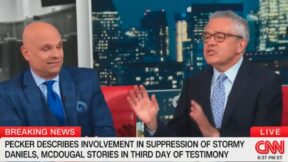Have Anti-Trump Conservatives Benefited or Paid a Price Due to Their Stance? The Results Vary Widely

Last week, I wrote about the sagging political state of anti-Trump conservatives in a world where President Donald Trump can claim to have solidified, against long odds, a conservative majority on the Supreme Court. As a follow up, I want to delve deeper into the issue of what makes anti-Trump Republicans tick and, specifically, whether they have paid a personal price for their opposition to Trump, or, counter-intuitively, if some have actually benefited from this position.
As part of this process, I took the most prominent Republicans and conservatives from the politics and media realm who have, at some point, been strongly opposed to Trump, and then broken them down into several different categories. Hopefully this exercise illustrates the evolution of the anti-Trump movement itself.
Given up: Jeff Flake and Bob Corker. These “Never Trump” U.S. Senators (there are several more on the House side) have understandably decided that, given they have no ability to be effective within a Trump-dominated GOP, they should retire from politics for now.
Passed away: John McCain and Charles Krauthammer. When America lost these two titans the cost was well documented. However, the enormous damage that was done by their passing to the conservative anti-Trump movement has been greatly underestimated.
Stayed the course: Bill Kristol, George Will, John Kasich, Mona Charen, Matt Lewis, Amanda Carpenter, Stephen Hayes (who has left the country!) and Jonah Goldberg. These conservatives have clearly tried to maintain a strong anti-Trump stance without losing their philosophical principles, or overtly catering to commercial and political considerations more than absolutely necessary.
Strange new liberal media respect: S.E. Cupp, Rick Wilson, David Frum, and Max Boot. These conservatives, of various stripes, have survived and perhaps even prospered by successfully finding new audiences on the left who are eager for truthful commentators to which they can point in proving how correct they are about Trump being really awful.
Totally sold out: Mark Levin, Brit Hume, Dana Loesch, Brent Bozell, Ted Cruz, Marco Rubio, Lindsay Graham, and Rand Paul. Each of these people were once clearly in the “Never Trump” category and overtly flipped into full MAGA cheerleader mode after it was clear that their economic and political survival depended on it (though given that Hume is semi-retired at Fox News, I will always be most baffled by his dramatic turn).
No longer conservatives: Ana Navarro, Jennifer Rubin, Steve Schmidt, Nicolle Wallace, and Matthew Dowd. All of them have dropped all pretense and have gone “full lib,” using their former “Republican” credentials as a way to satisfy their liberal media masters and sell out to the left every bit as much as others did on behalf of Trump. This group, at least for now, may have benefited more than any other.
Living off the land: Glenn Beck and former Wisconsin radio talk show host Charlie Sykes. These are the only two conservative media personalities, to my knowledge, who have clearly endured significant economic damage because of their anti-Trump position. Though Beck appears to be warming to Trump and recovering from the storm, and Sykes was able to write a book about the Trump phenomenon and appears regularly on MSNBC.
Playing both sides: Mitt Romney, Ben Shapiro, and Erick Erickson. These guys have all, with varying degrees of success, tried to navigate the Trump minefield by playing to both sides of the deep divide. Romney is about to become a U.S. Senator. Shapiro, using his ingenious, though highly-contrived and strategic, “Good Trump/Bad Trump” matrix for being supportive of Trump while still — far less often now — being critical of him, has played his hand nearly perfectly and is poised to be a hero in MAGA-land once he eventually goes all in for Trump in 2020 (heck, he is already selling his email list and “endorsing” fundraising pleas to his fans from Trump super-lackeys like Rep. Devin Nunes). Erickson has tried to duplicate Shapiro’s act, but is simply not as skilled at playing this obvious game.
___
In trying to discern who really has suffered and who has benefited because of Trump, I reached out to more than a dozen people (almost all of whom I know at some level) on this list. To my shock, while over half responded, only two of them went on the record with substantive responses.
Of those who passed, Atlantic columnist David Frum had the most interesting reasoning. “I don’t think it’s healthy to worry over-much about what one gets or does not get out of one’s political choices,” he said. “Let’s assess how the country is doing, not ourselves.”
Bill Kristol, who also took a polite pass on being quoted on the record, is fond of citing philosopher Eric Hoffer when it comes to explaining how economic factors dictate most of “conservative” commentary now. Hoffer’s quote — “Every great cause begins as a movement, becomes a business, and eventually degenerates into a racket” — is a pretty good description of parts of the “Never Trump” movement as well.
CNN commentator and Daily Beast columnist Matt Lewis (a friend) appears to share that same type of cynicism, borne of having seen the sausage made up close. He said:
“I used to think being Never Trump was inherently heroic and sacrificial. Not, anymore. Some Never Trumpers are exploiting this moment to become famous and completely abandon all their past loyalties and philosophy.
If you’re looking for financial success, the key is to pick a permanent side. Otherwise, you step on your own brand. So if you’re going to be Never Trump, you’ve got to go all in. This is why you so many conservatives who started off being against Trump end up being against Kavanaugh. It’s fan service.
The incentives all encourage belonging to a tribe. Case in point: Some of my new followers who hate Trump felt alienated when I call a mob a mob. So while I angered my newfound liberal ‘fan base,’ what are the odds Trump supporters discover a newfound respect for my writing? Not good.”
The foundational reality to which Lewis refers here, which is critical to understanding this entire issue, is that the universe of “anti-Trump conservatives” is simply far too small, too powerless, and too disorganized to be able to fully sustain a national media outlet or personality on its own. Therefore, those who are media “stars,” or want to be, are forced to either give in to Trump, or appeal to non-conservative and usually extremely liberal fans (especially since moderates, by definition, are not “fanatical” about much of anything).
Jonah Goldberg, of National Review, describes his situation this way:
“Well, it’s not some straightforward tale of woe. I’ll be fine. But I do find it sad the number of friendships and relationships that have been damaged or basically ended. I was much more worried about paying a price professionally early on. And there was some of that.
Last month, I was the opening speaker to the Philadelphia Society — a venerable conservative intellectual group. Some boycotted the whole meeting simply because I was there, some gave me a fair hearing, and some were jackasses. It’s all part of a new normal, everyone is trying to figure out.
I see it as more about opportunity costs than paying a price. For example, I’m a conservative and the natural audience for my books is on the center right. But I got a far, far, better hearing on my recent book from places like NPR, The Daily Show and Morning Joe than I did from Fox News, where I’ve been a contributor for years.
MAGAers tell me I’m “selling out” all the time. Selling out would have been to write one of these MAGA-fan-service books that Trump loves to promote. ‘Donald Trump: God or Demigod?’ or ‘Donald Trump Cured Cancer but the Deep State is Keeping It from You.’ Or I could have gone the other way and written resistance porn. ‘Donald Trump is really an Alien and He Will Anally Probe You If We Don’t Impeach Him.’”
As for me, before Trump I had already taken unpopular positions which I knew would harm my career within conservatism on three separate occasions (though I was naïve about how much hardship each would cause). Consequently, I had a lot less to lose than almost everyone mentioned in this column.
Thankfully, I have saved my money and, since I am married with kids, fame no longer matters to me. Therefore, telling the truth is pretty much my only motivator.
In that context, while being forced into exile, a man without a tribe, for likely the rest of my life, is extremely depressing, it is not actually the worst part of this equation. I never anticipated that I would also lose at least half a dozen fairly close friends (for someone who doesn’t like humans very much, that is a lot) largely because of my position on Trump.
Some of these falling outs have been my fault, some were theirs, and with some I didn’t even realize until much later that Trump was the real reason things suddenly broke off. All of these situations had one thing in common: they never would have been provoked by me being willing to criticize any other president than Donald Trump.
John Ziegler hosts a weekly podcast focusing on news media issues and is documentary filmmaker. You can follow him on Twitter at @ZigManFreud or email him at johnz@mediaite.com
[Photo via Win McNamee/Getty Images]
This is an opinion piece. The views expressed in this article are those of just the author.






